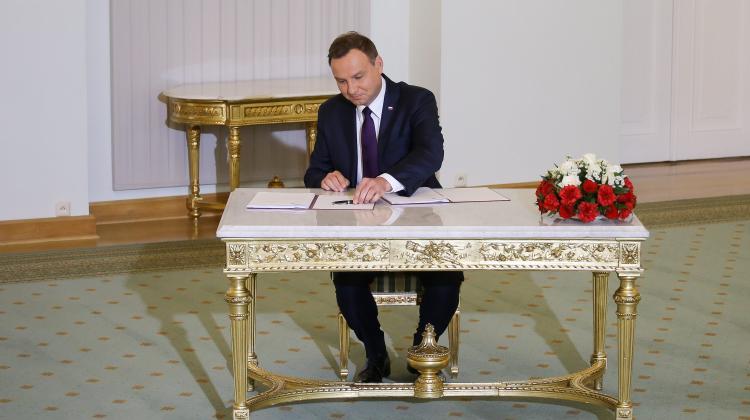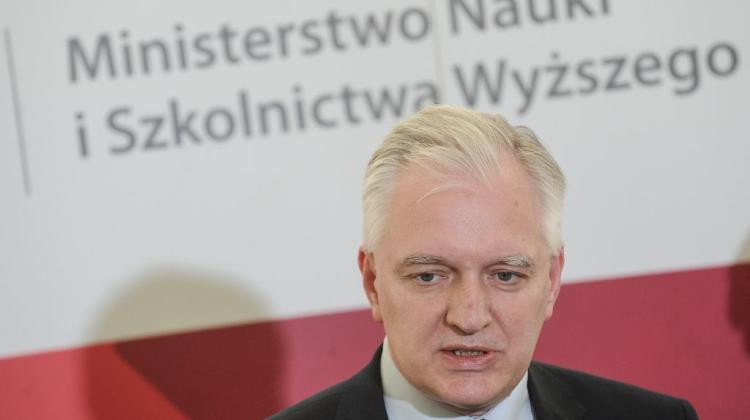The President signed an amendment to the Law on Higher Education

Last week on Wednesday, President Bronisław Komorowski signed on an amendment to the Law on Higher Education. These provisions, among others, lift the fees for the second course study and establish a new approach to the commercialisation of research. It is an errata and extension of the previous amendment of 2011.
The new regulations will facilitate access of adults to studies, mobilize universities to offer studies of better quality, and help universities cope with the demographic low. One of the objectives of the amendment is a clarification and correction of certain provisions that were introduced earlier - also in the 2011 amendment of the Law on Higher Education.
The amendment of 2011 - a flagship project of the then Minister of Science Barbara Kudrycka – limited the possibilities of faculty to work several jobs, introduced fees for the second course of study and to enabled universities to create courses of study and prepare their curricula. It turned out, however, that the law on universities prepared in 2011 (and earlier) is not without flaws, and the law had to be amended.
The amendment now signed by the President of implements the decisions of the Constitutional Court.
In June, the Constitutional Court ruled that introduced in 2011 provisions relating to tuition fees for the second and further courses of study are unconstitutional. According to these provisions, the only persons entitled to free second course study are those who receive the rector scholarship in that course every year (up to 10 percent students). Therefore, in the latest amendment, the provisions on the fees for the second course have been withdrawn.
The amendment also improved the solutions for the Polish Accreditation Committee. This body deals with, among others, the evaluation of the quality of education in particular courses of study. In July 2013, the Constitutional Court ruled that the provisions concerning the operation of the Polish Accreditation Committee are poorly constructed and that the committee incorrectly hears appeals from its decisions. This year\'s amendment envisages the appointment of appeal team within the Polish Accreditation Committee, which will be composed of different persons than those who take first instance decisions.
The recent amendment also extends the regulations concerning the commercialisation of research results. The 2011 regulations assumed that each university would establish the principles of commercialisation of research results in its own regulations. The recent amendment introduces a different solution for the commercialisation procedure. Initially the right to use the results of research scientist belong to the employing university. If the university start commercialisation within three months, the right to use innovation transfer to the researcher. The university and the researcher may, however, opt to forgo this procedure and develop another way to commercialise the innovation.
Regulations adopted in 2011 required universities to monitor the careers of their graduates in order to adapt studies to the needs of the labour market, however, they did not specify how this monitoring should be carried out. The current amendment introduces the monitoring of careers of graduates conducted using the ZUS (social security) data. The ministry will obtain data on careers of graduates in the anonymous form. This will allow to estimate, which courses give better chance of employment and better salary.
The amendment also clarifies the provisions on associations of universities. Universities forming an association are given the possibility of joint assets management and promotion of research.
The recent amendment also introduces many new solutions. These include provisions which require universities to distinguish between general academic and practical studies. For studies with practical profile, obligatory three-month practices are introduced. In turn, the students with academic profile should participate in the research conducted at the university.
A entirely new approach is also the newly introduced possibility of confirmation of the learning results at the university. The university will be allowed to exempt the student even from half of his classes, if the student can demonstrate the possession of knowledge or skills required by the university. The solution is designed to encourage adults to study.
The amendment of the Law on Higher Education (with the exceptions of certain provisions) enters into force 1 October 2014, but universities will be given more time to implement larger solutions. University authorities will have time until the end of June 2015 to introduce regulations to confirm learning results. By the end of 2016 universities should adjust profiles and curricula at the undergraduate and engineering studies, and by the end of 2017 - master\'s courses. By 1 October 2016, teacher training colleges and foreign language teacher training colleges should be completely closed.
PAP - Science and Scholarship in Poland
lt/ ula/ jbr/
tr. RL
Przed dodaniem komentarza prosimy o zapoznanie z Regulaminem forum serwisu Nauka w Polsce.


















